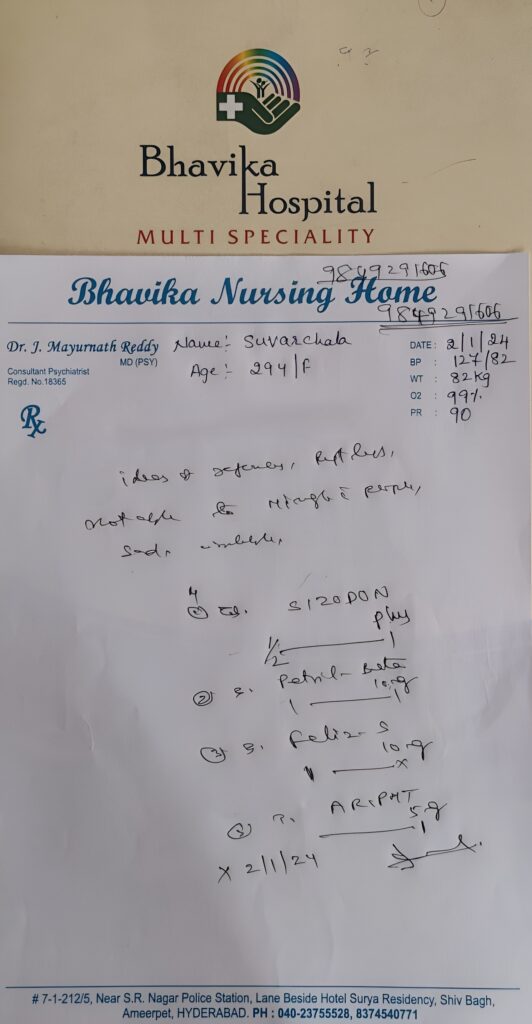

Concealment, Deception, and the Dangers of Hidden Truths in Marriage
Marriage is built on trust, honesty, and mutual respect. Kasumuru Suvarchala and her family, deliberately conceals critical truths to trap the groom into a marital bond where deceit, manipulation, and abuse transformed a sacred institution into a living nightmare.
Concealing the Truth: A Marriage Built on Lies
Before marriage, Suvarchala’s family hid her long-standing psychiatric illnesses schizophrenia, bipolar disorder, and insomnia. Medical prescriptions later revealed that she had been under treatment for more than a decade, consuming strong antipsychotics.
Despite this knowledge, her parents deliberately misled the groom’s family, presenting her as “normal” and trapping him into marriage under fraudulent pretenses.
But what followed was not just a troubled marriage it was a pattern of abuse, violence, and blackmail that left the husband physically injured, financially drained, and emotionally devastated.
Ethical Breach as a Doctor and as a Bride
One of the most disturbing aspects of this case is the deliberate concealment of lifelong psychiatric illness by Kasumuru Suvarchala, despite her full professional awareness of the seriousness of the condition.
Her husband eventually discovered that every night after dinner she was consuming psychiatric medication. When questioned, she admitted that she had been under the continuous treatment of Dr. J. Mayurnath Reddy of Bhavika Nursing Home for more than a decade. She revealed that her illness was lifelong and required permanent medication to control schizophrenia.
She further admitted that if the medicine was stopped, it would lead to severe psychological breakdowns, dangerous hallucinations, aggression, and uncontrollable behavior. Yet, even while consuming medication regularly, her episodes remained violent, abusive, and destructive.
Ethical Failure as a Doctor
As a qualified medical doctor, Suvarchala was in a position of knowledge, responsibility, and ethical obligation. Unlike a layperson, she could not claim ignorance of her own condition or its implications. Yet, she chose deliberate concealment, violating not only the trust of her spouse but also the very ethical standards of the medical profession.
1. Knowledge of the Side Effects of Psychiatric Drugs
Being a doctor, she was fully aware of the impact and side effects of the medications she was taking daily, such as:
-
Sedation and drowsiness that affect daily life.
-
Neurological complications, including tremors, restlessness, or involuntary movements.
-
Hormonal and metabolic side effects, such as weight gain, diabetes risk, or hormonal imbalance.
-
Dependency and compliance risks if medicines were skipped even for a few days, relapse or violent episodes could occur.
Despite knowing all of this, she chose to hide the fact of her mental status. This was not an innocent omission but a calculated suppression of material truth.
2. Understanding of the Progressive Nature of Schizophrenia and Bipolar Disorder
Schizophrenia and bipolar disorder are progressive psychiatric illnesses. Doctors are taught that:
-
These conditions often worsen under stress, such as marriage, relocation.
-
Even with regular medication, patients may experience relapses, hallucinations, or aggression.
-
The conditions cannot be “cured”, only managed, and require lifelong treatment.
-
Such disorders have a profound impact not only on the patient but also on spouses, children, and family members, who may face fear, trauma, and social stigma.
By hiding this reality, she knowingly placed her husband and his family into a high-risk environment without their consent.
3. Ethical Duty to Disclose Significant Health Information
The Medical Council of India (MCI) Code of Ethics emphasizes truthfulness, transparency, and informed consent. Doctors are trained that:
-
Patients have a right to full disclosure of material facts about their health.
-
Concealment of a condition that could affect another person’s safety or life is a serious ethical violation.
-
Medical professionals must not exploit their knowledge or position to deceive others.
As a doctor, Suvarchala had an even higher moral responsibility to be transparent. She knew that:
-
Her condition would directly impact her husband’s safety, mental health, and financial security.
-
Her violent episodes and unpredictable behavior could endanger elderly in-laws and neighbors.
-
Concealment would amount to fraudulent inducement into marriage an act that goes against both medical ethics and the law.
Her concealment was not just a personal choice it was a violation of medical ethics, betraying the very principles she was trained to uphold.
Ethical Failure as a Bride
Marriage is not just a social contract but a sacred union built on trust and transparency. When entering into such a bond, both partners carry a moral responsibility to disclose material truths that can directly affect the other’s life. Concealing these truths amounts to betrayal.
1. Serious Illnesses or Lifelong Conditions
When an individual suffers from a chronic or incurable illness, it fundamentally shapes day-to-day life, family responsibilities, and even long-term plans such as childbearing and financial stability. Conditions like schizophrenia, bipolar disorder, epilepsy, severe diabetes, or genetic disorders are not temporary inconveniences they are life-altering realities.
Failure to disclose such illnesses before marriage:
-
Deprives the spouse of informed consent, leaving them trapped in a relationship they may never have agreed to.
-
Exposes the unsuspecting partner to risks, including physical harm (as in violent psychiatric episodes).
-
Creates an unfair burden, forcing the spouse to take responsibility for a medical condition they were never prepared to handle.
Thus, hiding a serious lifelong illness is not only unethical but also amounts to cheating under matrimonial law.
2. Behavioral and Psychological Issues
Marriage is built on emotional compatibility and domestic peace. When a person has a history of severe behavioral or psychological disturbances such as paranoia, substance abuse, or psychiatric illness this truth must be disclosed.
Concealing such issues has severe consequences:
-
It destroys domestic harmony, creating a home filled with fear, abuse, and humiliation.
-
It harms family relations, where elderly parents, children, or tenants are dragged into constant conflict.
-
It erodes trust, because the partner feels deceived once the hidden truth surfaces.
In Suvarchala’s case, her violent behavior screaming at night, throwing objects, abusing neighbors and domestic staff showed how psychological issues, when hidden, can escalate into social and legal conflicts, damaging not just one person but the entire household.
3. Pre-existing Dependencies on Medicines or Treatments
A critical yet often ignored truth is when an individual is dependent on lifelong medication or continuous medical supervision. This dependency may include psychiatric drugs, neurological treatments, dialysis, insulin therapy, or even therapies for addiction.
Failing to disclose such dependencies:
-
Deceives the spouse about long-term responsibilities the financial, emotional, and practical burden of lifelong care.
-
Endangers the partner’s safety if medication is skipped, sudden dangerous behavior, relapse, or medical emergencies can occur.
-
Violates trust because marriage decisions would have been different had the truth been revealed beforehand.
In this case, Suvarchala was consuming psychiatric medicine daily after dinner yet her family deliberately hid this fact. She later confessed that if the medicines were stopped, she could suffer dangerous psychological breakdowns. Even while continuing treatment, her condition remained uncontrollable, creating a volatile and unsafe household.
Such concealment is not a “small omission” it is a deliberate act of fraud, both ethically and legally.
By deliberately hiding this truth, Suvarchala fraudulently induced marriage under false pretenses. This was not just a moral lapse but a crime of cheating under law, since her husband was misled into marrying her without knowing the reality.
The Dual Betrayal
Thus, Suvarchala committed a dual betrayal:
-
As a Doctor – She abandoned medical ethics, concealing critical health information, and ignoring the principle of truthfulness that forms the foundation of medical practice.
-
As a Bride – She cheated her husband by hiding a lifelong, incurable psychiatric condition that would directly affect his life, his safety, and the dignity of his family.
Her conduct amounts to both an ethical crime and a legal crime, transforming what should have been a bond of trust into a web of deceit.
Harassment and Violence
Once married, the façade quickly fell apart. What unfolded was a chilling series of violent and humiliating incidents:
-
Nightmares at Midnight: She would wake her husband at 2 a.m., screaming that “voices” were speaking to her, shaking him violently, and threatening, “I will kill you.” On one occasion, she slapped him repeatedly, poured water on his laptop, and forced him to sleep outside in the cold.
-
Danger to Neighbors and Tenants: She stormed into the tenants’ house yelling obscenities, accusing them of being “prostitutes and thieves.” She threw flowerpots from balconies and bricks at the gate, narrowly missing bystanders. Terrified tenants filed complaints and eventually vacated the house.
-
Attacking Family: Her elderly in-laws were not spared. She pushed them, hurled abusive language, and once nearly caused them to fall while climbing stairs. For senior citizens, such violence was not just humiliating but life-threatening.
-
Humiliating Behavior: Her actions made the home environment unbearable and toxic.
The Blackmail Tactics
Suvarchala perfected the art of psychological blackmail:
-
Threatening to file false police complaints if her demands weren’t met.
-
Spreading false rumors in the community about her husband.
-
Threatening self-harm to emotionally manipulate him.
-
Enlisting her extended family to trespass into the marital home, physically assault him, and publicly humiliate him.
-
Pressure for Extravagance: Holidays, luxury items, jewelry, and constant demands for money became routine. Every “no” was met with threats of self-harm, screaming, and emotional blackmail.
-
Parental Collusion: Her parents frequently called, abused the husband in filthy language, and pressured him financially. They encouraged her to leave the marital home unless their demands were met, using her as a tool of constant harassment.
Physically manhandled the husband inside his own home, while her parents shouted abuses. This was not a domestic disagreement it was criminal intimidation.
Finally, the situation became unbearable. When her husband questioned Suvarchala about her violent outbursts and unstable behavior, instead of accepting the truth or seeking help, he was attacked and abused. What should have been a marriage of companionship turned into a battlefield of fear, pain, and trauma.
Her actions mark her as one of the most dangerous kinds of women manipulative, abusive, and extortionist. She is not just a personal threat to her husband but a social danger, using blackmail tactics and exploitation like a blood-sucking predator.
This case must serve as a caution to society: families and individuals must exercise extreme care before marriage, verify truths, and protect themselves against such notorious women who misuse trust, manipulate emotions, and destroy lives.
